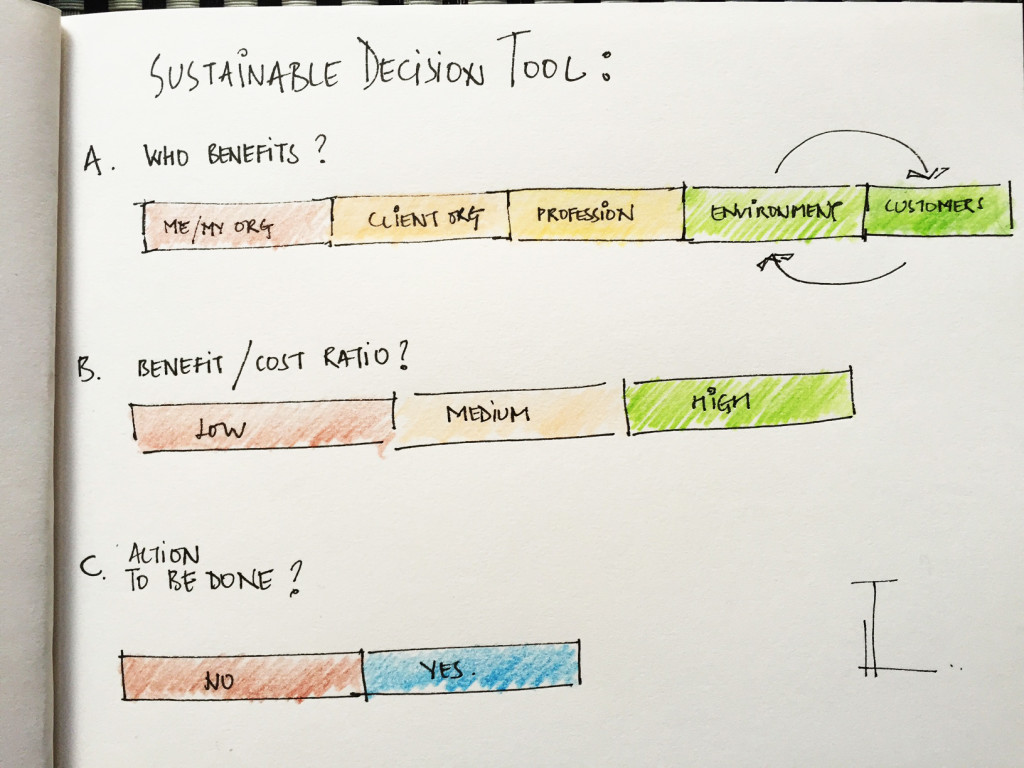Since I began deliberating on sustainability as a young Environmentalist (I like calling my self that), then a Designer, and for some time now as an Analyst, I have always felt the need for a clear benchmark on which to evaluate my actions. After all sustainability is an elusive concept. All development has an un rectifiable (though sometimes manageable) impact. About 10,000 years ago human population plus live stock was approximately 0.1% of the terrestrial vertebrate biomass. Guess what its today? Its 98% . Man has changed this world and there is no doubt we are only accelerating in doing it further that with our new technologies. I am in a field of researching and experimenting for sustainability, which perhaps my very research destroys. The questions thus before me are: What change is required and what is avoidable? What new products are useful and what are not? Which problems are worth solving and which are not?
As a designer, surrounding by such dilemmas about the definition of sustainability, inspired by romantic notions of saving the earth, I looked up to analysis to give me that clarity of action. I found that at best, analysis could compare options but it can’t help make good decisions. In-fact many times the very options being compared should not have arisen if the initial decisions had been taken on a different basis. Human brain is very tricky when it comes to making decisions. I have seen myself and numerous designers fall in love with our ideas and then justify them with the label of sustainability. Sometimes we are so good that we can even convince ourselves that mere optimisation of a bad decision is a good idea.
I believe this is not because we all are unaware or insensitive to the issues around sustainability. In-fact we are more aware than we ever were as a design community. I realise that information and technology has grown so much that we have tried to replace it for wisdom. Our analysis has become so complex that often we are not in a position to use it effectively to take action. Hence the key issues are often compromised as the design develops. Complexity replaces the simplicity that was required, often unnoticed. Wisdom is neither skill nor intelligence but it is an internal discipline that evaluates action on a higher basis. In design decisions, daily and especially conceptual ones, I feel that designers are armed with technology but seriously lack mental tools for sustainable decision making. I define a sustainable decision as a, conscious decision, that aims for maximum good, for maximum people and has minimum costs (or impacts) .
During my experiments with myself, I tried various analysis (complex at times), debates, discussions, brainstorming. I have come to believe, while all the above helped they did not give me a basis for a decision. The sustainable decisions, often by chance, came by a rather simple introspection on a few questions. I asked honestly
A) Who would benefit from this decision or action?
Me/My Organisation, Profession, Client, Customers/Common People or the Environment.
B ) What is the expected Benefit to Cost Ratio : At the beginning even an intuitive answer like
low, medium or high.
Of course i wanted a high benefit ratio for low cost (cost could be time, energy, carbon etc) and for most people. Aren’t we all about solving problems for people?
C) Should I take this decision or not?
Yes or No based on the value I give to the above two questions.
The above are rather few and simple questions (and deliberately that way too), but I feel if written out and shared honestly as a team, they become a useful mental tool. They can show what gets hidden behind jargon. It offers a basis to say No. Putting decisions and sub-decisions to its test is a way forward towards developing better mental tools for sustainable thinking.
See my friends, I have worked with smart, technical people and I don’t underestimate their value, just that I feel that even they took their most sustainable decisions when they could put them in front of a simplified value system based on an internal wisdom.
Harsh Thapar
more about the author at : https://uk.linkedin.com/in/harshthapar

